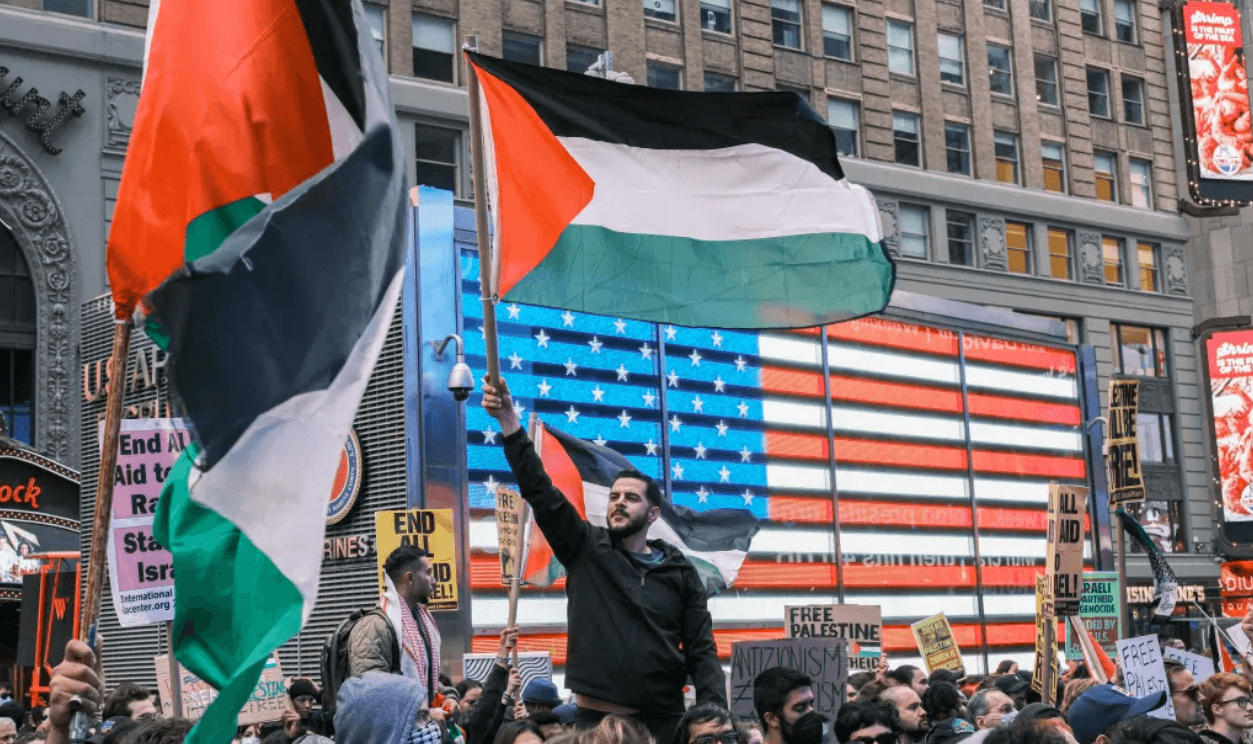8 November 2025 Ben Hillier

A Palestine solidarity protest in Times Square, New York, 8 October 2023 CREDIT: Daniel William McKnight/New York Post
“‘Palestine will free us all’—you know this slogan, right?” Michael Letwin, a co-founder of US solidarity group Labor for Palestine, was speaking with the enthusiasm of a recent convert, despite his decades of activism, over tea and coffee in Brooklyn’s Iris cafe last year.
It was some time in May, and northerly gusts whipping off the East River still sent occasional chills through the city, even as summer threatened to burst through the spring. Letwin wasn’t making small talk about the weather, though; he wanted to stress a shift in New York’s political climate. As students in Palestine solidarity encampments across the city were being slandered and smashed by authorities, their defiance seemed only to grow.
“The activists aren’t going through ‘stages’”, he said, referring to their political consciousness. “It’s more akin to something like ‘permanent revolution’—they are leaping over the old liberal progressive consensus and drawing much more radical, even revolutionary, conclusions.”
I was a little sceptical, having been in Hong Kong five years earlier, embedded in the siege of the Polytechnic, when police faced seemingly endless volleys of Molotov cocktails, petrol bombs, bricks and arrows from the city’s massive student movement. Almost everywhere across the city bore scars of a dramatic mood shift mobilised ferociously against the government—graffiti, boarded-up banks and shops, excavated footpaths, smashed signal boxes and traffic lights.
New York, by contrast, appeared totally unaffected as an urban space and broadly indifferent. You wouldn’t have known there was a movement unless you walked onto the campuses or stumbled into one of the demonstrations. Of course, I was comparing apples and oranges. Hong Kong’s rage manifested as a scream of physical confrontations everywhere, but without a noticeably commensurate lifting in the political level of the participants.
At any rate, despite my unspoken misgivings, it wasn’t hard to get caught up in the excitement of the New York campuses, where spectacular things certainly were happening. And Letwin wasn’t the only person talking about a momentous political shift—anyone with a long history on the left, and particularly Jewish leftists, all were saying similar things: Gaza had precipitated a generational crisis within liberal Zionism, the effects of which would be far ranging.
It has been striking since then to watch the decline of the street-based Palestine solidarity movement in Israel’s key supporter. The resistance has been bigger in countries that matter far less than America: Australia, Italy, the UK, for example. Yet it’s clear now that Palestine didn’t disappear as an issue, and possibly played out in the New York mayoral election in ways that were not so evident from afar. John Ganz, a left-wing writer based in New York, writes in his Unpopular Front newsletter:
“Israel’s place in American politics was more the unquestioned status quo than ideological, even for many Jews … Then there was Gaza. Suddenly, all those activists didn’t seem so crazy after all. Maybe they had a point—or two. And so Mamdani’s views [that Israel ought to be a democratic state with equal rights for Palestinians] rapidly go from being an eccentric force in American politics to a central one. It wasn’t so much that the election was a referendum on Palestine, Israel, or, even less, the Jews, as some race baiters want us to believe, but that Mamdani now sounded reasonable and attached to reality, while the people who were defending Israel tooth and nail and calling everyone else antisemites and terrorists now sounded like the wild-eyed ideologues.”
That is, Palestine as a signal of political sanity. Perhaps even more than this, Mamdani’s stance might have become a signal to people that he was genuinely different from other politicians in other ways. “When pressured to temper his criticisms of Israel, Mamdani has barely flinched”, Eric Lach writes in the New Yorker. “These qualities convinced many young voters, in particular, that he might have what it takes to follow through on his promises.”
While bread and butter issues appear to be the singular driving force of the campaign, Palestine figures here not as a background foreign policy issue irrelevant to running a city, but as a bellwether for political character. It not only played a role as a moral question that helped drive the young volunteer mobilisation but as an indication of political spine and integrity that pushed up Mamdani’s vote.
After all, someone who can withstand the unending and vicious barrage of the Zionist movement surely has a shot at tackling a rental crisis, delivering free child care and buses, and taking two cents on the dollar in tax from incomes above $1 million—none of which are likely to be as ferociously denounced as the call for equality in Palestine.
In this sense, “Palestine will free us all” suggests something akin to a revelation about the operations of capitalism and the nature of mainstream politics: Gaza shows that the rule of naked, brutal, unapologetic power is ubiquitous. The jettisoning of reason, the silencing of arguments and the resort to brute force are happening not only “over there”, but are mirrored in day-to-day establishment politics, and in the marginalisation of people speaking the truth in workplaces, campuses and the public sphere everywhere.
Michael Letwin and others, then, might have been proven right, not only about New York’s spring being more than a seasonal change, but about how Palestine became central to even local politics, albeit in ways that many would not have predicted.


